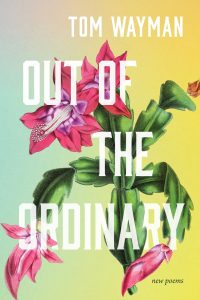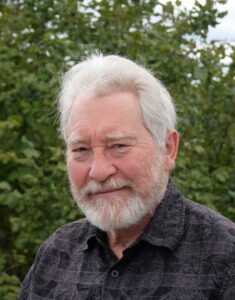A world in a drop of rain
Out of the Ordinary: New Poems
by Tom Wayman
Madeira Park: Harbour Publishing, 2025
$22.95 / 9781998526123
Reviewed by Harold Rhenisch
*

Tom Wayman is an ordinary guy. An everyday kind of guy who gets up, makes some coffee, goes to work, and comes home. And like any ordinary working man, sometimes the work gets in the way of the other ordinary things. That’s when a man of principle steps out of the ordinary and organizes, all to keep the ordinary safe.
That’s what Wayman is doing in this book (well, all his books, really): organizing. Putting things in line. He’s a line-man.
That’s right. He’s a poet. His work isn’t running a feller buncher or stocking shelves at the Super Store, or all those other things people do to keep their ordinary lives going. You know, work.
Wayman’s lines aren’t hydroelectric. They aren’t picket lines, either. They’re lines of verse. His product is a performance in which thoughts are broken into breaths, which match syntax in ordinary ways and develop stories one breath at a time.
This ordinariness, this breaking into units and sending them to us in ordered steps of thoughts counts. Counting, you could call it. A poet’s measures. The sweeps of his broom, like this in “Gratitude to Trees”:
It’s work that doesn’t concentrate attention on imaginary, metaphysical, or spiritual connections. It does imagine the interiors of things, but it doesn’t represent them as big ideas or elaborate patterns and rhythms. To Wayman, they are metaphors for moments of connection.
the trees watched
as I navigated with little pain
my descent into bed.

Wayman’s primary metaphor for this work is a carrot seed. It is not, he writes in explanation, “a miniature carrot that enlarges under certain conditions,” but then asks, “What would I encounter if I could climb inside?” He simplifies the question in “Thor in His Boat,” where he notes that “before the cosmos’s start, nothing // was inside anything, / and outside didn’t exist either.”
This book is a package for such seeds. They’re not just carrot or radish seeds, though. They are other ordinary things of this world: a (wistful) penis in autumn, a cathedral, a bag full of rain, lazy snow, and so on. The book is garden for them all.
With water, heat, and light, carrot seeds grow into carrots. With attention, anything in the world is a seed for Wayman. For example, in “Offering” he meets a raindrop, that he is at first “afraid is a planet of water,” with no place for him. After he held his breath, though, and “pushed through the membrane, / I stood in a narrow / chapel or sanctuary / or tunnel, bright with the glow / of translucent quartz.”
Reading Wayman (Watching a Man Break a Dog’s Back: Poems for a Dark Time) is as if you had just stopped by on the road to the Valhallas and he was leaning on the handle of a shovel and he opened his hand and said, hey, try one of these carrots, eh, aren’t they sweet.
The crop here is human connection with the world and people at the same time. For Wayman, such connection is the real work of a poet, just as the job of a pipe fitter is to join pipes. It is not the hard physical labour of a coal miner, but connections one builds over a beer after work, when everyone is equal: tree fallers, Homer, the Beowulf poet, and especially (in “Covid Elegy: Guitar, Stand Up Bass, and Rain”) one of Wayman’s heroes, labour activist Gordie Larkin,
at the mic,
his fingers marked by maritime hooks and lines,
formed a chord, then another,
then a third, combining
to belt out a creed: We’re moving.
Rule by kings, priests, owners
pushed aside or blunted.
Wayman ends the poem with the prediction, or perhaps hope, that “Indoors, someone, somewhere, / is tuning Gordie’s old guitar.”
Well, Wayman is. He is the organizer now, telling his stories in ordinary ways, over a metaphorical beer. They have a playful quality, recognizable from West Talk, that old logger’s language of this coast, an “I’m telling you a story now” quality, reading the audience for laughs across a terrycloth tabletop, where the “differing kinds of beer are not on tap, / just beer by pitcher or glass,” or at a small town hall reading in the Slocan, where he makes his home.
Mark Twain was a writer of this kind. Don Gayton tells yarns like this. Red Lane did. Pete Trower did. Red Lillard did. Wayman stands in their company. Like all of them, at times the poems are refined literary objects, such as in “Wounds,” where his voice and Lillard’s join:
One [wound] is the planks of the love-bridge
that collapsed beneath me: my body dripping
toward a place
it never meant to go.
At other times, Wayman’s poems rely on the sentimental surprise endings of stand-up comedy or open mic performance, where the audience brings everyday cultural knowledge to the poem and completes it, as a participatory comic affirmation of common foundations in the world, as in “Cleaning the Counter”:
even the dish rack stored away
under the sink, the emptied countertop
wiped clean, ready
for more
On the page, the more is adrift, but in performance it would sing. In other endings of this type, trees stare out into the cold, a train runs on, there is dancing (and much more), all giving the poems away to people in the world, for them to carry
This is what one of our master poets wants to give us now that he is an elder—this ordinariness of poetry, its roots in people, and the role of a poet as the defender of human connection, even with seemingly non-human things. For Wayman, it is ordinary to be like this.
To ensure these understandings aren’t misconstrued, like any good reader at a mic, between the book’s sections Wayman tells us what he is about to do, deliberating removing any sense that to him poetry is either a puzzle or a mystery. For him, it is janitorial work. Clearing out the cobwebs. Straightening things out, like Puck in A Midsummer Night’s Dream, sent out with a broom to sweep the stage clean of dust before the actors come on or the audience leaves for the world.

*

[Harold Rhenisch has written thirty-five books from the Southern Interior since 1974. He won the George Ryga Prize for a memoir, The Wolves at Evelyn. His other grasslands books are Tom Thompson’s Shack and Out of the Interior. He lived for fifteen years in the South Cariboo and worked closely with photographer Chris Harris on Spirit in the Grass, Motherstone, Cariboo Chilcotin Coast, and The Bowron Lakes; and he writes the blog Okanagan-Okanogan. Harold lives in an old Japanese orchard on unceded Syilx Territory above Canim Bay on Okanagan Lake. [Editor’s note: Harold Rhenisch has recently reviewed books by Estlin McPhee, Al Rempel, Hari Alluri, Brian Day, Jason Emde, John Givins, DC Reid, Kim Trainor, Dallas Hunt, and Tim Bowling for BCR. His The Salmon Shanties was reviewed by Steven Ross Smith. Tom Wayman’s memoir, The Road to Appledore, was reviewed at BCR by Harvey De Roo, and Catherine Owen reviewed How Can You Live Here?, a recent volume of his poems.]
*
The British Columbia Review
Interim Editors, 2023-26: Trevor Marc Hughes (non-fiction), Brett Josef Grubisic (fiction and poetry)
Publisher: Richard Mackie
Formerly The Ormsby Review, The British Columbia Review is an online book review and journal service for BC writers and readers. The Advisory Board now consists of Jean Barman, Wade Davis, Robin Fisher, Barry Gough, Hugh Johnston, Kathy Mezei, Patricia Roy, and Graeme Wynn. Provincial Government Patron (since September 2018): Creative BC. Honorary Patron: Yosef Wosk. Scholarly Patron: SFU Graduate Liberal Studies. The British Columbia Review was founded in 2016 by Richard Mackie and Alan Twigg.
“Only connect.” – E.M. Forster